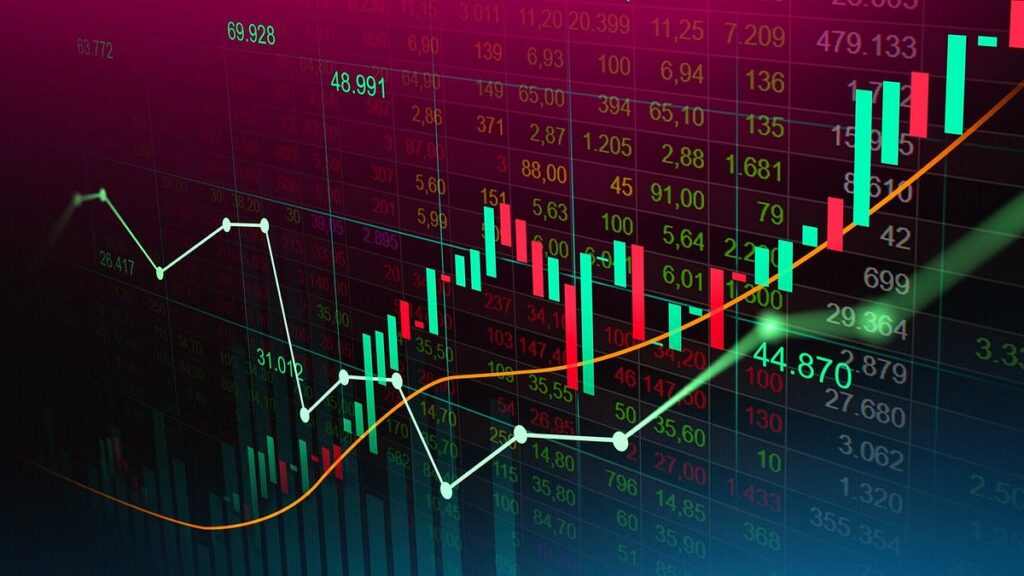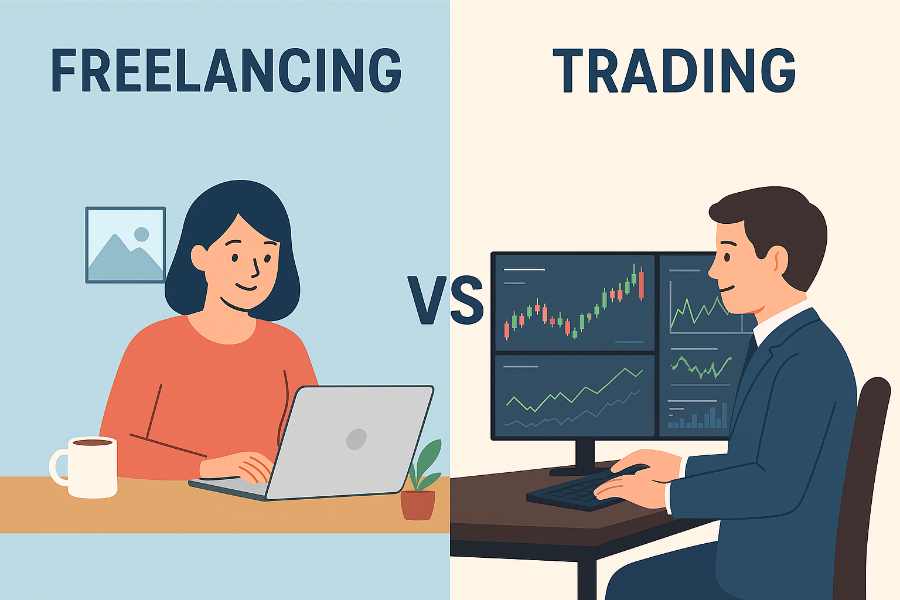In today’s fast-paced digital era, everyone dreams of earning online — to be their own boss, work freely, and build financial independence. Among the most popular ways to make money from home are freelancing and trading. Both seem attractive, both offer flexibility, and both can become long-term careers.
But when it comes to Freelancing vs Trading – which is better, the answer depends on who you are, what skills you have, and how you deal with risk. Let’s explore both in depth and see which one fits you best. if you want to known about forex trading click on this link
What Is Freelancing?
Freelancing is a form of self-employment where you use your skills and expertise to work for clients around the world. Instead of doing a full-time job for one company, freelancers work on different projects for multiple clients.
For example, a person skilled in graphic design, content writing, digital marketing, or web development can offer their services online and get paid per project or per hour. Platforms like Upwork, Fiverr, Freelancer.com, and Toptal have made freelancing accessible to anyone with a skill and internet connection.
Popular Freelancing Fields:
- Content writing and copywriting
- Logo design and branding
- Website and app development
- SEO and social media management
- Video editing and animation
- Virtual assistance
The biggest advantage of freelancing is freedom — you choose your clients, your prices, and your working hours. Over time, as your portfolio grows, your income and reputation grow too.
What Is Trading?
Trading means buying and selling financial instruments such as stocks, forex, or cryptocurrencies to earn a profit. Traders analyze market charts, news, and trends to predict whether prices will go up or down.
Unlike freelancing, where you earn through your work, trading is about using knowledge, timing, and strategy to make money from market movements.
Main Types of Trading:
- Day Trading: Buying and selling within the same day.
- Swing Trading: Holding trades for a few days or weeks.
- Long-Term Investing: Buying and holding for months or years.
Trading can be done through online platforms such as MetaTrader, Binance, eToro, or Robinhood. The starting capital can be small, but the risk is high, and learning market psychology takes time.

Freelancing vs Trading: The Core Differences
| Feature | Freelancing | Trading |
| Income Type | Active – earn for your work | Passive/Speculative – earn from market changes |
| Investment Needed | Low (just time and skill) | High (money required to trade) |
| Risk Level | Low | High |
| Consistency | Stable with regular clients | Unstable; depends on market |
| Skills Required | Creative/technical skills | Analytical and emotional control |
| Learning Curve | Gradual and skill-based | Steep; requires strategy and practice |
| Work Flexibility | Work anytime, anywhere | Depends on market hours |
| Stress Level | Manageable | High during volatile markets |
Both paths give independence, but their nature is very different. Freelancing is like building a business through skills; trading is like investing and predicting the future of markets.
Similarities Between Freelancing and Trading
Though freelancing and trading belong to different worlds, they share a surprising number of similarities:
- Freedom and Flexibility: Both allow you to work from home or anywhere in the world.
- No Boss: You make your own decisions — you control your time and workload.
- Unlimited Earning Potential: Both can be highly profitable once you master your craft.
- Depend on Skill and Knowledge: Success in both fields comes through continuous learning and discipline.
- Online Platforms: Both rely on digital tools and global connectivity.
In short, both freelancing and trading can change your financial life if approached with the right mindset.
Pros and Cons of Freelancing
Pros:
✅ Flexible schedule
✅ Low startup cost
✅ Steady income potential
✅ Global exposure
✅ Opportunities to build long-term clients
Cons:
❌ Requires time to build reputation
❌ Irregular workload in the beginning
❌ Need to handle multiple clients and deadlines
Freelancing rewards patience, communication skills, and quality work. The more reliable you are, the more repeat clients you attract.
Pros and Cons of Trading
Pros:
✅ Potential for high returns
✅ Work from anywhere
✅ No direct dealing with clients
✅ Can become a source of passive income
Cons:
❌ High risk of loss
❌ Emotional stress and decision pressure
❌ Requires market knowledge and strong discipline
❌ No guaranteed income
Trading rewards those who stay calm under pressure, manage risks wisely, and treat trading as a business — not gambling.
Which One Should You Choose?
Choose Freelancing if:
- You have a skill or are willing to learn one.
- You prefer stability and predictable growth.
- You enjoy creative or technical work.
- You want to build long-term career relationships.
Choose Trading if:
- You love finance, numbers, and market analysis.
- You can handle emotional ups and downs.
- You have some capital to invest.
- You enjoy fast-paced decision-making and challenges.
For beginners, freelancing is often a safer start because it doesn’t require investment and helps you develop professional discipline. Once you have stable income, you can explore trading as a side venture.
Freelancing and Trading Together – A Smart Strategy
Why not combine both? Many people earn a steady income through freelancing and then invest part of their savings into trading. This approach reduces financial pressure and helps you learn trading calmly without risking too much.
Freelancing gives you consistency; trading gives you growth potential. Together, they create a balanced online income stream.
Final Thoughts
Both freelancing and trading are powerful ways to earn online, but they suit different personalities.
If you’re someone who values creativity, client interaction, and skill-based growth, freelancing will give you long-term stability and satisfaction.
